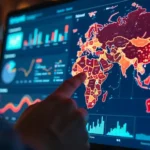Introduction: A New Era with AI at the Forefront
We’re living in a time where Artificial Intelligence (AI) is no longer a buzzword reserved for tech conferences or sci-fi movies. Instead, it’s rapidly becoming a part of our everyday lives — from how we shop and work to how we socialize and even receive healthcare. The recent surge in AI innovation is transforming industries, changing job roles, and influencing how we make decisions.
General News Logicalshout brings you a comprehensive look at how AI is impacting modern life, what it means for the average person, and where this powerful technology is headed.
AI and the Workplace: Productivity, Automation, and New Careers
AI has fundamentally shifted the dynamics of the modern workplace. Tools like ChatGPT, GitHub Copilot, Jasper, and Midjourney are giving professionals across fields—from software development to marketing—supercharged capabilities. These AI-powered assistants can write code, craft compelling content, design visual concepts, and even analyze data in minutes.
On the flip side, automation driven by AI is also raising concerns about job displacement. According to a 2024 McKinsey report, up to 30% of tasks in 60% of occupations could be automated in the next decade. However, the same report points out that AI will create more jobs than it destroys—especially in sectors like AI training, cybersecurity, data analysis, and human-centered services.
So while some traditional roles may phase out, the rise of AI is expected to give birth to entirely new job categories that require hybrid skills, blending human creativity with machine learning insights.
AI in Healthcare: Diagnosis, Treatment, and Patient Care
Healthcare is one of the sectors experiencing a true AI revolution. From early diagnosis to personalized treatment plans, AI algorithms are helping doctors make faster, more accurate decisions. Google Health, IBM Watson, and several startups are leveraging AI to detect diseases such as cancer, Alzheimer’s, and cardiovascular conditions at early stages.
AI-driven wearables like Fitbit and Apple Watch now do more than count steps—they can monitor heart rhythms, detect falls, and even alert emergency services. Hospitals are also using AI chatbots to manage appointments, provide symptom checks, and improve overall patient interaction.
Despite these advances, experts emphasize the importance of a human touch. AI tools should assist, not replace, healthcare professionals. Ethical concerns, data privacy, and algorithmic bias remain top priorities as the technology evolves.
The Influence of AI in Education: Smarter Learning Systems

In the world of education, AI is powering personalized learning experiences. Platforms like Khan Academy and Duolingo use adaptive learning algorithms that tailor content to individual student needs. This means students can learn at their own pace, revisit difficult concepts, and receive instant feedback—creating a far more efficient learning process.
Teachers, too, benefit from AI. Grading automation, plagiarism checkers, and class performance analytics allow them to focus more on engagement and less on repetitive tasks. Additionally, AI-powered tutoring systems help bridge the gap for students needing one-on-one support.
However, educational equity is a major challenge. Not all schools have access to these technologies, and there’s an ongoing debate about how AI tools might impact critical thinking and real-world problem-solving.
AI and Everyday Convenience: Smart Homes, Shopping, and Entertainment
AI isn’t just transforming major industries—it’s quietly revolutionizing our daily routines. Smart assistants like Alexa, Siri, and Google Assistant are now household staples, managing everything from grocery lists to thermostats and lighting systems.
When it comes to shopping, AI plays a behind-the-scenes role in everything from product recommendations to fraud detection. E-commerce giants like Amazon use AI to personalize shopping experiences based on browsing history, preferences, and behavior patterns. At the same time, AI chatbots offer 24/7 customer support, drastically improving service quality.
In the entertainment world, platforms like Netflix, Spotify, and YouTube use AI-driven algorithms to recommend shows, songs, and videos. These algorithms analyze user behavior in real-time, keeping users engaged for longer periods—a trend that’s not only reshaping entertainment but also affecting mental health and attention spans.
Ethics and Concerns: What Are We Giving Up?
With great power comes great responsibility. The rise of AI has sparked serious conversations around data privacy, surveillance, algorithmic bias, and misinformation. Facial recognition systems, for example, are under scrutiny for racial bias and mass surveillance concerns. Social media platforms have also been criticized for using AI to push echo chambers and spread false narratives.
AI-generated content—like deepfakes and synthetic media—raises questions about authenticity and trust. Who owns AI-generated work? What happens when AI mimics a person’s voice or image without consent?
Policymakers worldwide are working to regulate AI. The European Union has introduced the AI Act to classify AI systems by risk and ensure transparency. The U.S. and other countries are following suit, attempting to strike a balance between innovation and ethical responsibility.
AI and Creativity: Art, Music, and Literature
One of the most fascinating applications of AI is in the creative arts. AI models like DALL·E, Midjourney, and AIVA are generating artwork, music compositions, and even poetry that rival human creations. AI-generated music has even made it into mainstream platforms, sparking debates over originality, copyright, and the nature of creativity.
Some artists embrace these tools as collaborators, using AI to push creative boundaries. Others view AI as a threat to authentic, human-made art. As AI becomes more involved in creative industries, the lines between human and machine-made content continue to blur.
Future Outlook: Where Is AI Headed Next?
As we move further into the 2020s, AI will only grow more powerful and pervasive. Some of the future applications include:
- Autonomous Vehicles: Companies like Tesla and Waymo are racing to perfect self-driving technologies that rely heavily on AI for perception and decision-making.
- AI in Climate Tech: AI is being used to model climate change patterns, optimize renewable energy grids, and monitor deforestation and pollution.
- AI Companions: Emotional AI and chatbots are evolving into digital companions for mental health support, elderly care, and even therapy.
At the same time, the integration of AI with other technologies—like quantum computing, blockchain, and IoT—promises unprecedented innovations. But with that innovation comes an urgent need for ethical frameworks, public understanding, and responsible development.
Conclusion: Embracing AI with Awareness
Artificial Intelligence is no longer a futuristic concept—it’s a present-day reality. From automating workflows to redefining creativity and helping save lives, AI’s influence on society is both vast and growing. But it’s crucial that as we embrace the benefits, we also remain vigilant about its risks.
LogicalShout believes that awareness, education, and balanced discussions are the keys to navigating this AI-driven world. Whether you’re a student, a business owner, or a curious reader, understanding AI’s role in our lives is no longer optional—it’s essential.



